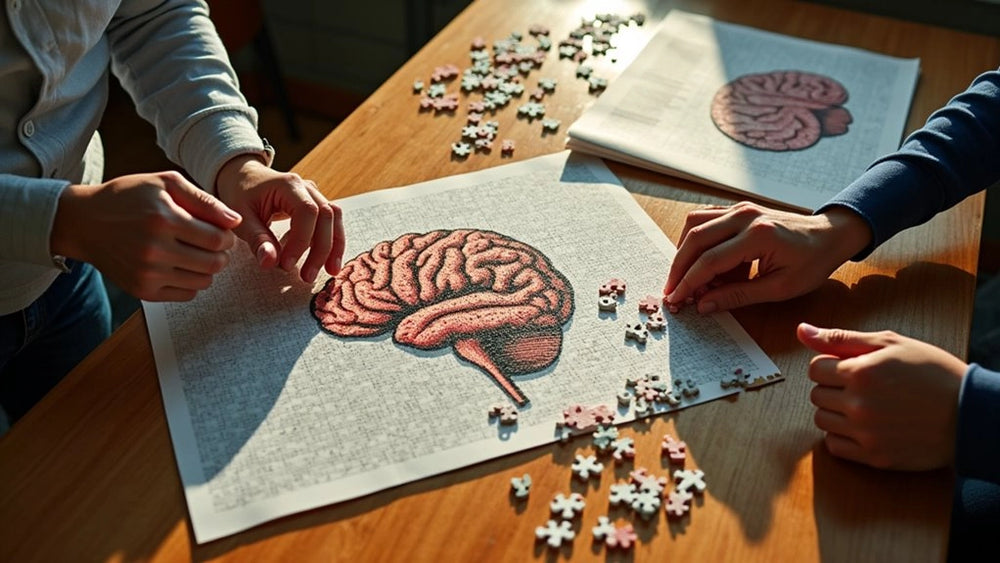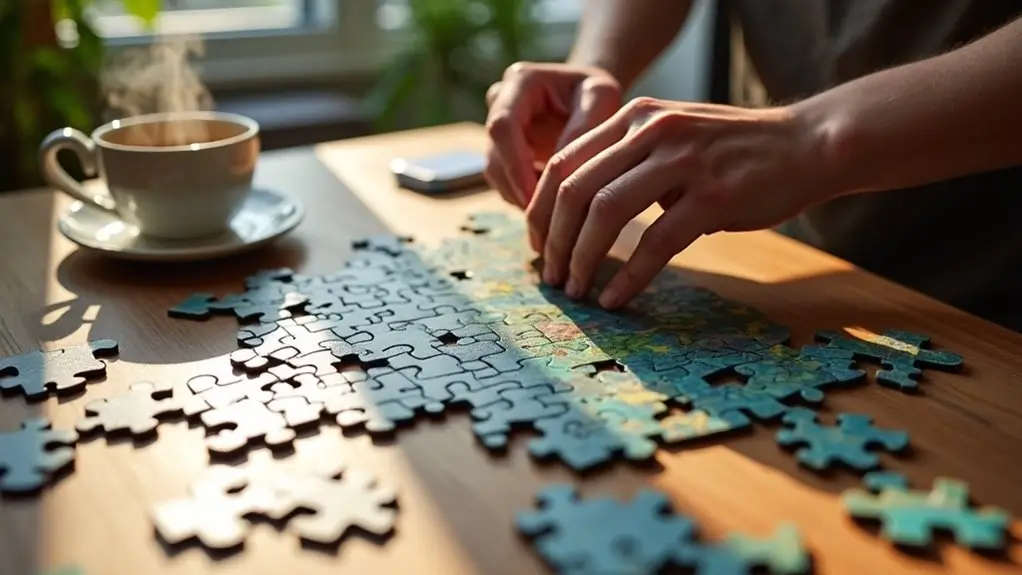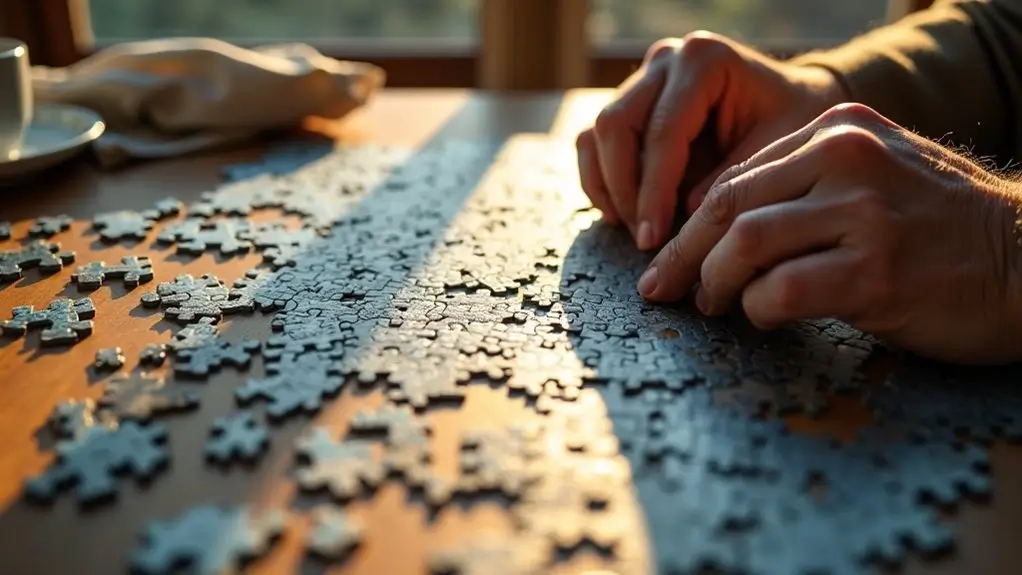
Why Are Puzzles So Addictive? Exploring Jigsaw Puzzle Addiction
Puzzles have captivated minds for centuries. They draw people into intricate worlds of logic and creativity. Why are puzzles so addictive? This can be attributed to a blend of cognitive challenge and emotional pleasure, offering a unique escape from reality.
Whether it's jigsaw puzzles, crosswords, or Sudoku, each type engages our brains in different great ways. All puzzles promote problem-solving skills and provide a sense of accomplishment. As we delve deeper into the psychology behind puzzles, we’ll uncover the reasons why they keep us coming back for more, time and again.
Key Takeaways
- Solving puzzles releases dopamine in the brain's reward system. It creates a pleasurable feedback loop that drives continued engagement.
- Each correctly placed piece provides instant gratification and visual progress. This reinforces the desire to keep solving.
- Puzzles create a meditative, stress-relieving state. They help people escape daily pressures and achieve mental focus.
- Combining achievable challenges and clear goals provides a satisfying sense of accomplishment and control.
- Social aspects and online communities transform puzzling into an engaging shared experience. They foster a competitive spirit and collaboration.
Why Are Puzzles So Addictive? The Psychology Behind

To understand why you're addicted to puzzles, let’s explore the psychology behind their appeal.
The Reward System in the Brain
You may think solving puzzles is just a fun hobby. But the activity actually triggers a powerful chain reaction in your brain's reward system.
This reward cycle intensifies as you make progress. Every small victory fuels your motivation to tackle more challenging sections.
You'll crave the satisfaction of putting together pieces. Because your brain's natural response to these achievements creates an addictive feedback loop. The immediate confirmation of correct placements keeps you engaged and focused.
Sense of Accomplishment and Satisfaction
Success drives the magnetic pull of puzzle-solving. It creates a powerful psychological reward system that keeps you returning for more. Every piece you place correctly delivers an instant sense of accomplishment, reinforcing your desire to continue.
The visual progress will motivate you as your puzzle comes together, piece by piece. The structured nature of puzzles gives you clear goals and measurable achievements.
When facing life's uncertainties, you'll find that puzzles provide a controlled space where your satisfaction increases with each small win. This mix of small successes and clear results makes solving puzzles very rewarding.
Psychological Escape and Stress Relief
Diving into puzzles provides a strong escape from daily pressures. When you feel overwhelmed, the structured puzzle-solving process helps you regain control and focus.
You'll shift away from anxious thoughts as you engage in the methodical task of finding and placing pieces.
The soothing, repetitive actions create a calming state. It makes you feel relaxed, reduces stress, and promotes mindfulness. As you concentrate on the challenge, time slows down, and your worries fade, replaced by the satisfying rhythm of solving puzzles.
Why Are Puzzles So Addictive? The Social Aspect

Puzzles are not just a solitary activity. Their social aspect plays a significant role in their appeal.
Collaborative Problem-Solving
Puzzles are often used as a solitary activity. However, the teamwork in completing a puzzle together adds a special social element.
Working with others on a puzzle, you'll see how different perspectives can help. These varied problem-solving methods can lead to quicker solutions.
Collaborative problem-solving strengthens community bonds. You can share strategies and celebrate small victories together.
Each person's unique strengths emerge during the process, whether it's spotting patterns or organizing pieces.
Focusing on a common goal enhances communication and provides a helpful distraction from daily stress. This makes puzzle time productive and therapeutic.
Share Achievements with Friends and Family
Share your puzzle successes with friends and family. This turns a personal achievement into a group celebration. When working on puzzles together, you’ll find unique strengths in your group. Everyone brings their problem-solving skills.
You’ll engage in meaningful conversations about strategies and build stronger emotional connections. The shared experience creates lasting memories and helps you escape daily stress together.
Recognizing each other's achievements during the puzzle process creates a supportive atmosphere. This helps keep everyone motivated. This social aspect turns individual success into shared joy and strengthens relationships.
Online Puzzle Communities and Competitions
Digital connectivity has transformed puzzling from a sort of solo activity. Online puzzle communities now offer a vibrant social experience.
You'll find diverse platforms where you can connect with fellow puzzlers worldwide. You can share strategies and participate in real-time collaborative puzzle-solving. These communities offer exciting virtual competitions and leaderboards. They fuel your competitive spirit while fostering friendly rivalries.
Regular events, like timed challenges, keep you engaged. Themed tournaments also motivate you to improve your skills.
Best of all, you’ll find a supportive environment where puzzle lovers from different cultures gather. They share techniques and celebrate achievements in this growing digital landscape.
Why Are Puzzles So Addictive? Cognitive Benefits
The appeal of puzzles goes beyond entertainment. They also engage your minds in fascinating ways.
Improved Memory and Concentration
Regular puzzle-solving boosts your brain's cognitive abilities. This is similar to how exercise builds muscle. Engaging with puzzles activates important areas of your brain, especially the occipital lobe. They can improve visual processing and memory retention.
You'll notice improved focus and concentration as your brain releases dopamine. This helps you stay focused on complex tasks.
Studies show that consistent puzzle work improves short-term memory and mental flexibility. As you solve puzzles, you build critical thinking skills. Plus, you train your brain to maintain sharper concentration in daily activities.
Enhanced Problem-Solving Skills
Beyond sharpening your memory, puzzle-solving remarkably elevates your overall cognitive abilities.
When you engage with puzzles, you simultaneously activate both sides of your brain. This will strengthen your problem-solving prowess and analytical thinking.
You look at shapes, colors, and patterns to find a fit. So you develop important cognitive skills beyond the puzzle table.
You'll notice improved visual and spatial reasoning. This helps you better navigate and organize your daily life.
Through consistent puzzle engagement, you're building mental flexibility and resilience. This trains your brain to tackle new challenges with enhanced precision and confidence.
Stress Relief and Mindfulness
Solving puzzles offers a natural path to tranquility and mental clarity. When you work on a jigsaw puzzle, you'll notice your heart rate and blood pressure decrease.
This mindfulness practice creates a meditative state. It draws your attention away from daily worries. You're not just escaping stress; you're actively reducing it. Each correctly placed piece triggers your brain's reward system. This releases dopamine, which enhances your well-being.
The structured nature of puzzling helps you regulate emotions. Meanwhile, it provides a sense of purpose and achievement. It's a powerful tool for finding calm in chaos.
Types of Puzzles and Their Appeal
To better understand their appeal, let’s explore the different types of puzzles.
1. Jigsaw Puzzles
- Description: Pieces that fit together to form an image or scene.
- Appeal: Enhances spatial reasoning, patience and provides relaxation through visual satisfaction.
2. Crossword Puzzles
- Description: Word puzzles where players fill in a grid based on clues.
- Appeal: Strengthens vocabulary, memory, and problem-solving skills while offering intellectual stimulation.
3. Sudoku
- Description: Number-based puzzle where players fill a grid while following specific rules.
- Appeal: Develops logic, concentration, and pattern recognition.
4. Logic Puzzles
- Description: Puzzles requiring deductive reasoning to solve problems or scenarios.
- Appeal: Engages critical thinking and improves reasoning skills.
5. Rubik’s Cube
- Description: 3D puzzle requiring alignment of colors on all faces of a cube.
- Appeal: Builds spatial awareness, dexterity, and problem-solving under constraints.
6. Riddles
- Description: Short puzzles presented as questions or statements requiring creative thinking.
- Appeal: Encourages lateral thinking and imagination.
7. Word Search Puzzles
- Description: Find specific words hidden in a grid of letters.
- Appeal: Improves focus, attention to detail, and vocabulary.
8. Maze Puzzles
- Description: Navigate through a path to reach an endpoint.
- Appeal: Sharpens planning and decision-making skills.
9. Mechanical Puzzles (e.g., Locks, Interlocking Rings)
- Description: Physical objects requiring manipulation to solve.
- Appeal: Enhances hand-eye coordination, patience, and spatial reasoning.
Each type offers a unique mental workout. It caters to varied interests and intellectual needs.
The Market for Puzzles
Let’s take a closer look at how puzzles have evolved into a thriving global phenomenon.
Growing Popularity of Puzzle Games
You'll find puzzle addiction has gone mainstream. More people discover how these games enhance mental well-being and provide a therapeutic escape from daily stress.
Social media has revolutionized how you engage with puzzles. It connects you to vibrant communities. There, enthusiasts share achievements and collaborate on challenges.
The rise of puzzle subscription services makes it easier to feed your puzzle obsession. This delivers fresh challenges right to your door. Meanwhile, it supports the growing mindfulness movement.
Trends in Puzzle Design and Innovation
Modern puzzle design has undergone a remarkable evolution. This is fueled by surging consumer demand and creative innovation in the market.
Innovative puzzle designs feature contemporary artwork, intricate patterns, and popular cultural themes. The industry's response to this demand has changed regular jigsaw puzzles. They're now more advanced forms of entertainment.
Trends in puzzle design now emphasize quality materials and precision engineering. This ensures pieces fit perfectly and last longer.
Subscription services have revolutionized accessibility, delivering unique puzzles right to your door. Sales rose by 370% during the pandemic. So manufacturers are still looking for new ways to improve your puzzling experience.
Conclusion
You likely enjoy puzzles because they stimulate your brain. Solving each piece releases dopamine and helps you connect with others while puzzling together.
Whether you work on crosswords, jigsaws, or brain teasers, you satisfy your mind's need to solve problems. This also helps you gain valuable mental benefits.
FAQs
What Happens if You Do Puzzles Everyday?
You'll boost your cognitive functions, memory, and problem-solving skills. Your brain produces more dopamine, improving your mood. Daily puzzling creates routine and reduces stress. It may also help protect against cognitive decline as you age.
Why Do I Enjoy Puzzles So Much?
You enjoy puzzles because they activate your brain's reward system and encourage creativity. They provide a great escape that helps you feel accomplished and focused.